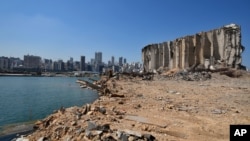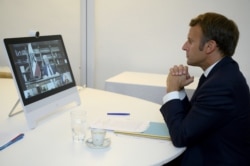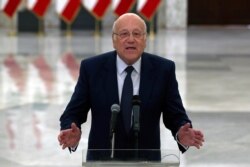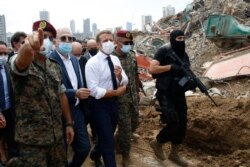France hopes to secure more than $350 million in humanitarian aid for Lebanon’s crisis-battered population at a donors’ conference it co-hosts with the United Nations Wednesday — marking the year anniversary of Beirut’s deadly port blast. International pressure is growing for Lebanon’s fractious parties to unify and push through reforms.
Roughly 40 representatives of international institutions and heads of state were expected at this video conference, including U.S. President Joe Biden and Jordan’s King Abdullah.
It marks the third international meeting Paris has hosted this past year to support ordinary Lebanese, struggling under deepening poverty and spiraling inflation and unemployment. The World Bank calls Lebanon’s political and financial crisis since 2019 the world’s worst since the mid-19th century.
Co-hosted by the U.N. Wednesday’s virtual talks come exactly a year after the massive explosion of fertilizer stocked at Beirut’s port, which killed more than 200 people, injured thousands and devastated big chunks of the capital.
International frustration is growing over Lebanon’s squabbling political parties. Lebanon’s new prime-minister-designate, billionaire businessman Najib Mikati, said he was unable to form a new government before the blast anniversary. His predecessor, Saad Hariri, gave up efforts to do so.
Hasni Abidi, international relations professor at the University of Geneva, said France and other donor nations cannot invest in Lebanon in a sustainable way so long as there is no government willing to engage in real reforms demanded by the international community.
Apparently to ramp up pressure on Lebanon's parties, the European Union announced it had adopted a legal framework for sanctioning individuals and entities seen as undermining the country's rule of law and democracy.
Before the EU framework was announced, a European Union spokeswoman said it was too soon to talk about specifics in terms of sanctions.
Former colonial power France has played a leading role in mobilizing international backing for struggling Lebanese and in prodding the country’s politicians.
French President Emmanuel Macron was the first foreign leader to visit Beirut after the 2020 blast. Days later, he held a first international funding conference — and another, this past June, to support Lebanon’s financially strapped army.
Some critics suggest France has little to show for its efforts thus far and should have imposed tough sanctions against Lebanon’s political elite early on. Others say it is up to Lebanon’s politicians to act. Otherwise, they say, there is little the international community can do.
Sources: AFP, Reuters, Al Jazeera, The New York Times, AP, ESSEC-French business school webinar.







